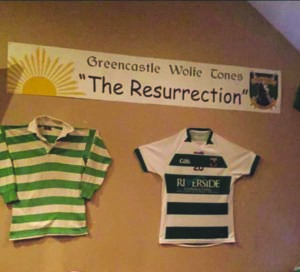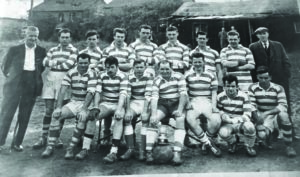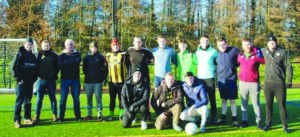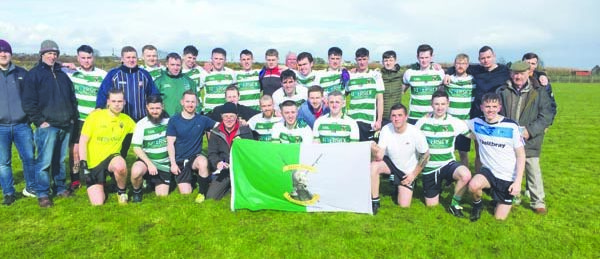IT almost seems like a different era when sport was at the forefront of people’s minds.
It’s absence from our lives in recent weeks and months has only served to highlight its role in society beyond the health benefits of those who partake.
Reruns of vintage games only makes the heart yearn for the return of competitive sport. But these are unprecedented times and it remains understandably unclear when contact sport, and Gaelic Games in particular, will be safe to return as the world struggles to come to terms with the Covid-19 pandemic.
As Spring draws to a close, the summer months should be ushering the best that Gaelic Games has to offer as the Championship season begins to loom.
Alas, clubs throughout Ireland will have had their league and Championship aspirations put on an indefinite hold as our governments North and South grapple with the complexities of competitive sport and social distancing.
For Antrim GAA’s newest entity, Greencastle Wolfe Tones, those aspirations included a return to action after a hiatus of just over 50 years following the club’s rebirth at the tail end of 2019.
Granted permission to compete in the South Antrim leagues for 2020, the North Belfast men were set to face Sarsfield’s on Tuesday, April 2 at Fennell Park or ‘The Cricky’ as it is commonly known.
By that time, however, the gates to all GAA pitches throughout Ireland were locked with nobody quite sure when they’ll reopen.
Greencastle’s chairman Stephen McCourt admits it could be 2021 before they compete on the field, but he stressed there is a resilience among the committee to retain the momentum they had gained since the reformation of the club.
“We were all set and raring to go on April 2 – that was the date the South Antrim league was due to start,” stated McCourt.
‘We had the players registered and we had been affiliated to the South Antrim league for this year and everything was ready to go.
“The squad had been training for 10 weeks and we had secured the services of ex-Antrim panellist Enda McAtamney to come in as first team manager.
“It is obviously a set-back that everything has stopped because of Covid-19, but equally it has afforded us more time to plan for our future and secure the longevity of the club.
“We’ve spent time over the last few weeks having Zoom committee meeting and chats on how we can take the club forward and ensure that Wolfe Tones GAC becomes a fully-functional GAA club situated within the Greencastle area.”

Greencastle GAC are keen to embrace its roots with the revived club sporting the same colours as the original
Like many other GAA clubs, the current crisis has not only united communities but brought out the best in them.
Although Wolfe Tones are only in their infancy, they have been assisting the local community foodbank at Bawnmore to make and deliver food packs for Greencastle residents. The club also undertaken fundraisers to ensure the foodbank is well resourced to provide for all those in need.
Among the members, there is already a strong bond and McCourt says it is vital to maintain contact through the pandemic in order to emerge as a stronger entity when live finally resumes a form of normality.
“We had been going well since Christmas time until around Mid-March. We had a few challenge games under our belt and we were getting ready for the league. The players were all ready to go,” stated McCourt.
“What we’ve tried to do in the meantime is maintain constant contact with the players so there is no drop-off or lull period.
“We had the momentum there and we have to try and ensure that, when training and games do resume, the players are itching and raring to go.
“All the directives we have received from Antrim GAA and Croke Park is about maintaining contact with all members, playing members and non-playing members.”
The new club have already made great progress and there is a determination to ensure they are around for the long-term.
McCourt acknowledges they could do worse than look at the remarkable success of near-neighbours Naomh Éanna, who actually benefitted from assistance from Greencastle when they started out in the 1950s.
“Some of our members would have ended up with St Enda’s after the club folded,” said McCourt.
“Initially the club had been in existence from the 1930s right up to the early 1970s.
“When St Enda’s were formed in the 1950s, Greencastle significantly helped them and actually lent them their first kit for their first season to ensure they could play football.
“The development of St Enda’s in recent years has been phenomenal and has been great for the GAA in North Belfast and Newtownabbey.
“In terms of our redevelopment, it basically started with six people having a discussion on how you could put together a sporting and cultural vehicle in the area. One thing I know from growing up in the area is a lack of vehicles either to play sport for to be involved in the Irish language and Irish cultural development.
“We looked at how we could do that and one idea was to resurrect the Greencastle Wolfe Tones club.
“We carried out a mini feasibility study within our area. We went out to residents, parents and potential players and committee members to see if there was an appetite to resurrect the club and if there was a player base to tap into.
“We discovered there wasn’t just an appetite to see it happen, but there was significant appetite to assist in building such a project.”

Greencastle, Wolfe Tones’ footballers of the past
He added: “When we had all the foundations in place to get the club off the ground, sustainability became the key word – nobody wanted a flash in the pan or a one-season wonder.
“We wanted a GAA club that will serve the community for years to come and it became clear that, before a ball was kicked, that we had to put in place a strong off-field structure to work in building a successful club.
“We then recruited for our first team and we’ve ended up with 40 players. We were brought in to the South Antrim league and then we got a manager so it was really smooth sailing because there was that appetite for GAA within the Greencastle community.”
Arguably the most difficult part of Greencastle’s rebirth is set to come and that involving putting in place a juvenile structure that will allow them to coach and nurture its future senior stars.
The numbers appear to be there and the club will start with three underage teams at U6, U8 and U10 level with the hope of adding to those teams in the coming years as they establish themselves in the area.
“We wanted to ensure that, in two or three years time, the project didn’t fold,” said the Greencastle chairman.
“A major focus has been to plan for a large juvenile structure. The best way we can do that is having a well-resourced, well-coached programme delivered by qualified and vetted coaches.
“The long-term vision is to build a large and functioning GAA unit that can bring success back to the community here and that requires long-term strategic planning. Building the club in the short term, as should as Covid-19 ends, we will put together a large and vibrant juvenile set-up starting with three age groups – U6, U8 and U10. They will be the first juvenile teams in the area for 50 years.
“The aim is to preserve the sustainability of Wolfe Tones GAC. It means in 10 years, we have a new first team coming through when those U10s reach 19, 20, 21 years of age. They will be ready to step into the first team.
“We’ve been working closing with Gaelfast, who have been great in helping us plan for this key component of our strategy.”
While the club’s senior team will compete in the South Antrim league, the hope is that, by the time the current underage players reach senior level, the club will be well established in the all-county leagues.

Members of the current squad at training
“Some of the fellas haven’t played together and some of the players haven’t played at all. After this season ended, the plan was to assess where we were in terms of how the league fared and if we hit the aims set by the management team,” said McCourt.
“From there, we were to assess whether another season in South Antrim would be best or go into the all-county leagues.
“The current first team has a very young demographic – 10 of the players are U21.
“The majority of those over 21 are under 25 so that team should peak in three or four years’ time. That will offer us a chance to look at the best league to go into without having to worry about a loss of players just yet.
“That first team should be in place without many retirements for around 10 years. After that, the hope is the current juveniles can then step in to replace those players.”
If those plans seem necessary in order to ensure the long-term viability of the club, a partnership with the Ulster University team at Jordanstown will seek to ensure the club isn’t just viable, but successful.
Having started out at the Valley Leisure Centre, the club struck a deal with Jordanstown for the use of their state-of-the-art facilities for training and also for their home matches.
Having a GAA club on the doorstep of the university will be something which will benefit Jordanstown in the long run as well and McCourt is delighted with the help they’ve received thus far.
“We started training at the Valley and we had the boys there every Sunday,” added the Wolfe Tones chair.
“As things started to develop and other stakeholders became involved, we sat down with the GAA team from Ulster University at Jordanstown. They offered us facilities and help with coaching and wider assistance.
“We struck a deal with them to use their facilities for matches and additional training on Thursday nights. We planned to use that pitch for our home matches in the South Antrim league.
“They are happy to help us out and, as far as they are concerned, there isn’t enough Gaelic Games being played this side of Newtownabbey.
“They are eager to see the growth of the GAA in areas where it has been dormant. Ulster University and Paul Rouse have been fantastic throughout in offering their assistance and, ultimately, we hope it is a partnership that will benefit the university in the long run.”
Just before the Covid-19 pandemic halted all sporting activity, Greencastle Wolfe Tones lined out for their first challenge game away to Ardglass GAC of Down.
They may have suffered a defeat, but it was another major step in getting the project moving in the right direction.
The South Antrim leagues would have been several games into the season by this stage and nobody is certain when things will resume.
“There is talk at the moment that we could see some form of a season by October or November. If that’s the case, it will be the 2021 season before we start – I’d imagine the South Antrim leagues won’t take place this year.”
Should Wolfe Tones have to wait another year for a return to competitive action, the hard work of their committee and the local community will ensure they will be more than just a ‘one season wonder’ and that, more than 50 years after their original formation, Gaelic Games will once again prosper in Greencastle.






